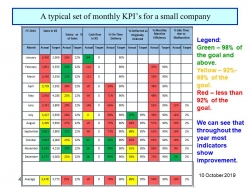This article refers to Haim Shapira’s book “conversation about Game theory” published in Hebrew by Kineret Zmora Bitan Dvir Ltd.
Links to articles about Business & Marketing can be found at the end of the article.
Dan was rushing to a meeting that was scheduled for 10:30 am. It was already 10:20 and he could not find parking space in the car park of the tower building. Suddenly he spotted a green light indicating a free parking slot. He accelerated towards the light only to realize that a female driver was maneuvering her car into that slot. She drove backwards and forwards trying to steer her way between the lines. That was all Dan needed. He quickly pushed in front and parked his car, leaving the lady driver bewildered. He took a quick look in the mirror, fetched his briefcase, and hurried to his meeting. “Well,” he thought to himself, “I really had no choice, my meeting is about to begin”.
The lady driver was naturally upset and called after him, but he pretended not to hear and rushed away.
Dan was slightly delayed by the security guard at the doorway (something about the validity of his permit) and entered the building at 10:32 when he saw the lady who’s parking slot he had just taken, staring at him while waiting for the same lift. He muttered a few apologetic words and disappeared.
Is it a true story?
The event described above did not happen, but it could have done. I have based it on two incidents I have experienced in real life.
The first incident I experienced happened a few years ago when I was reversing into a parking slot when a nifty driver pushed his way in front of my car, wearing a smug smile on his face. A young boy of about 12 years old was sitting next to him and I remember thinking how education to violence is passed on through the generations.
The second incident occurred recently. A friend whom I met at a conference was surprised to see a woman he had talked to earlier at the car park. He told me that a few moments before, he noticed a woman trying to park her car in the same slot he was trying to park his. He let the woman park and was happy to have done so to avoid embarrassment.
A moment before theory
The story I made up and the first encounter described above present negative behavior (“Don’t do”). This article, however, is about positive behavior (“Do”). We will first, look at some negative and positive examples of behavior, then at a theoretical explanation for negative behavior and finally draw some conclusions.
I will also give CEOs my advice before Summary and conclusions.
Prisoner’s dilemma and returns – is impolite behavior unique to driving?
In his book “conversation about Game theory”
Haim Shapira describes how the prisoner’s dilemma is manifested in various situations in life. Shapira presents two examples:
First: soldiers of a military company were freed to go home for a long weekend. However, a soldier had to stay behind to guard the camp and one was randomly picked. The disappointed soldier turned to a fellow soldier asking him to take his place because he had arranged a rendezvous with a girl he was madly perusing. His friend agreed.
Second: Joining a busy motorway from a side road is almost impossible at rush hour. One waits in vain for a courteous driver to slow down and give way.
I have a friend who is a prime example of politeness and courtesy, except when driving his car. He told me that every time he drives through the Elephant Junction in Ramat Gan, female drivers try to block his way, overtake him on the inside and drive dangerously. When he spots them, he quickly breaks to the right to block their way. “They should learn” he said and added proudly that some of these women have learnt their lesson and steer away from him. The thought that these women may be young mothers hurrying to collect a child from kindergarten, had never crossed his mind. Even if it did, it would probably not change his awful behavior on the road.
Third: A lady friend once described herself as a “mean beast” when driving a car.
Haim Shapira’s game theory
The game in the story about the soldiers is about returns, says Shapira. We expect that if we give up on something important, like going home for the weekend, our friends will do the same for us in return. In these situations, we are willing to be considerate.
However, on the road we are anonymous. Giving way to an anonymous driver will not be returned. Our courtesy on the road will not pay back because it will not be remembered by other drivers.
Shapira concludes that people tend to be nice and considerate to each other when they recognize what Robert Axelrod calls “the shadow of the future” – i.e. when there is a chance they will see the person again.
Competitive advantage and courtesy
Does discourteous behavior on the road reflect our true nature? Will courteous behaver enhance our competitive edge in business?
My team had been leading long negotiations with a large firm based in Hong Kong. when I was the manager of Shamir Optical Industry Ltd. Over three long years we had been experiencing ups and downs and there were times when I thought the negotiations would never mature to an agreement. One day we received note from the negotiating CEO asking to come to Israel to sign the agreement.
As we had already established good and open relationships, I allowed myself to ask why had it taken three years to reach the conclusion? The CEO replied that all that time he had been watching our business behavior. He also asked European CEOs’ opinion about the way Shamir were conducting business with them. He particularly mentioned names of two people who influenced his decision: Mr. Sammy Versano, who had been a customer and a friend of Shamir optical industry and Mr. Gay Baynin, a Belgian businessman who used to visit us at our international exhibitions around the world. Mr. Baynin never placed an order and for various reasons I knew he would never purchase our products. All the same, I was always friendly, courteous, and respectful. Both these people’s recommendations helped us close the deal with the Hong Kong firm.
Anonymous recommendations
Recommendations given by word of mouth are a valuable marketing tool. We never know who will recommend or slander our company and when it will happen.
Politeness and courtesy cannot be preplanned by Machiavellianism. One either has it not. Our reputation depends on the little things we do in life, even for people we have never met. One moment can make an impression. Unfortunately, courtesy and politeness are rare these days, those who have it, benefit.
Drivers’ courtesy is essential.
The road leading from the village Kafar Karra to Wadi Arra motorway is extremely narrow. There are no traffic regulators like traffic lights or roundabouts and therefore it is always congested. Joining the motorway may be possible only if drivers are willing to slow down and give way. The same situation occurs in almost all the inner roads at the village.
All drivers using this road know that, although they cannot be identified while driving and although they are virtually anonymous to one other, courtesy is essential, or traffic will stand still. To allow the traffic to move and to be able to reach their destination they must consider other drivers. Consequently, almost every time drivers try to join the motorway, enter a narrow inner road, or exit a parking space, they are given the right of way.
Things may turn around
You may be an important manager today, but tomorrow you might be looking for a new Job. I find it difficult to remember the number of times people turned to me for help to find jobs. The reasons are many. One may decide to pursue a new career, conditions of the jobs may worsen, companies change hands, lay off employees or simply shut down. Anything can happen to make you look for new employment and suddenly, the people who were once under your management are the ones to decide the future of your career.
Good relationships you build now, will serve you in the future.
Summary and recommendations
Haim Shapira’s analysis of when we chose to be courteous, presents relationships based on our ability to benefit from the situation. In general, he is correct, but nothing is black and white. We all have a little of both. However, the more courteous and optimistic we are, the more we will benefit, in business and in life. I know that advising people to be courteous in business might be somewhat hypocritical but, in my opinion, it is the right thing to do.












 My First Book: Manage! Best Value Practices for Effective Management
My First Book: Manage! Best Value Practices for Effective Management